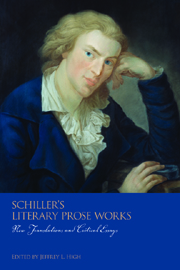Book contents
- Frontmatter
- Contents
- Foreword
- Preface
- Acknowledgments
- Notes on the Translations
- Introduction: Schiller and the German Novella
- The Translations
- The Critical Essays
- 9 (A fragment of) A True Story (from most recent history): The Truth in Schiller's Literary Prose Works
- 10 Playing with the Rules: Schiller's Experiments in Short Prose Fiction, 1782–1789
- 11 Diderot and Schiller's “Revenge”: From Parisian Parody to German Moral Education
- 12 True Crime and Criminal Truth: Schiller's “The Criminal of Lost Honor”
- 13 Der Geisterseher: A Princely Experiment or, the Creation of a “Spiritualist”
- Chronological List of Schiller's Literary Prose Works in English Translation
- Works Cited
- Notes on the Contributors
- Index
9 - (A fragment of) A True Story (from most recent history): The Truth in Schiller's Literary Prose Works
from The Critical Essays
Published online by Cambridge University Press: 05 February 2013
- Frontmatter
- Contents
- Foreword
- Preface
- Acknowledgments
- Notes on the Translations
- Introduction: Schiller and the German Novella
- The Translations
- The Critical Essays
- 9 (A fragment of) A True Story (from most recent history): The Truth in Schiller's Literary Prose Works
- 10 Playing with the Rules: Schiller's Experiments in Short Prose Fiction, 1782–1789
- 11 Diderot and Schiller's “Revenge”: From Parisian Parody to German Moral Education
- 12 True Crime and Criminal Truth: Schiller's “The Criminal of Lost Honor”
- 13 Der Geisterseher: A Princely Experiment or, the Creation of a “Spiritualist”
- Chronological List of Schiller's Literary Prose Works in English Translation
- Works Cited
- Notes on the Contributors
- Index
Summary
His whole tale is nothing but a series of fabrications designed to string together the few truths that he found it in his interest to reveal to us.
— The Prince in Schiller's The SpiritualistWHILE SCHILLER COULD ENVISION himself as one of Germany's leading historians, an important aesthetic theorist, and a poet and dramatist for the ages, ironically — considering the impact and resonance of his prose works — he himself laid no such claim to a place in the history of literary prose. According to Schiller, it was the necessity of broad and colorful life experience, which he believed he lacked, that distanced him from literary prose works:
The author of narrative prose cannot get by with the world within himself. He needs to be familiar with and have experience in the world outside him. This is exactly what I lack, and in my opinion, it might as well be everything.
His stated belief that the prose genres demand broad familiarity with the external world, and that he lacked precisely this, very strongly implies that Schiller envisioned a very brief career as an author of literary prose. However, it must be countered that it was precisely his peculiar, if limited, true life experiences — absolutist Württemberg, the proximity to the Duke, his malaria and lung ailment, his dramatic escape and exile, his patrons and friends — that provide the sources for and personally inform each of his original prose works.
- Type
- Chapter
- Information
- Schiller's Literary Prose WorksNew Translations and Critical Essays, pp. 173 - 187Publisher: Boydell & BrewerPrint publication year: 2008



